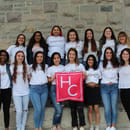Often unnoticed and misunderstood, eating disorders represent the highest mortality rates of any mental illness. According to a study by the National Association of Anorexia Nervosa and Associated Disorders (ANAD), “without treatment, up to 20% of people with serious eating disorders die” and specifically to anorexia, “18-20% of anorexics will be dead after 20 years.”
Imagine the often private and agonizing struggles of those affected by disordered eating. Whether out of a need for control of their lives or as a societal distortion of beauty ideals, eating disorders affect everyone, and maybe event those closest to you.
Having been in and out of treatment in a battle that lasted over thirty years, my mom was told she would never recover from her disordered eating. But she did, and she is a total badass. As follows is a somewhat conversational interview with my mom, which in all honesty, should have been a surfaced discussion long before this week, National Eating Disorders Awareness week.
1. Why is body positivity important to you? How did your struggle begin?
It used to be because of other people judging you. I will say that I think that women are sometimes worse to other women. I think having to conform to the ideal beauty standard was how it started. After a while, it became more complex than that.
2. How do you prioritize your well-being?
I didn’t when I had an eating disorder. You begin sacrificing who you are and your actual health for this shell of an image.
3. In what ways, do you hope to create more awareness for eating disorders?
Getting beyond the stigma, understanding that it is the deadliest of mental health disorders.
4. Do you think people don’t take it seriously?
They don’t take it seriously, they think it’s either eating too much or too little, but it’s much more than that. It starts off as a diet, then it becomes about control, self-esteem and a lot of things. You can’t control most things in life but you can control what you eat.
5. What treatments were the most effective for you?
The correct medicines and therapy. It is one of the hardest things to actually recover from.
6. So with battling disordered eating for nearly thirty years, what helped cure you?
Finding a voice. A lot of people with eating disorders don’t speak up for themselves. I think that’s helped a lot. I have no idea how this just stopped miraculously. I think I found strength I didn’t know I had, especially during Pop’s sickness [her father, my grandfather.]
7. Can you talk about your tattoo?
The reason I got that was because of what I struggled through. To recover when nobody thought I ever would. I think it is a miracle, I wanted this tattoo to stand for the battle I fought for thirty years. There are people that will recognize that symbol. Others will ask me about it, and sometimes they have a daughter who is struggling with it.
8. Is this a woman’s disease?
Not necessarily, I remember when I was in the hospital, there was a young boy there battling this. It’s harder for men, many don’t expect it. Recently, there was a male figure skater in the Olympics who had an eating disorder.
9. What kind of insensitivities have you dealt with?
It’s very hidden; its a very shameful thing. To be honest, most people don’t know. A lot of people think all they are is an appearance or what people see, but they are so much more than that.
10. What change do you hope to see by sharing your own story?
If I can help young women before they get so entrenched. My heart is that women get help right away, for friends to pay attention and encourage someone to get help. Whenever you left the hospital they give you a score on your ability to recover, and they never thought I would recover. Look at me, after thirty years, completely recovered. There is hope for those struggling. If I could just help one person, then that would be so meaningful.
Maybe you have known someone with an eating disorder or you are battling this illness, but please know that this is not the end. You are stronger than you know, and you CAN overcome disordered eating. Take it from my mom, who for thirty years, fought against this all-consuming disease and won.
Please find the following resources helpful in guiding yourself or others you know to treatment.
National assistance:
You may reach the National Eating Disorders Awareness Helpline at (800) 931-2237
More information is available at the NEDA website. Another great resource is (NAMI), National Alliance on Mental Health.
On-campus facilities:
Visit the Cook Counseling Center for getting help with an eating disorder.
Image sources: Author’s own
Resources: Mirasol INC



